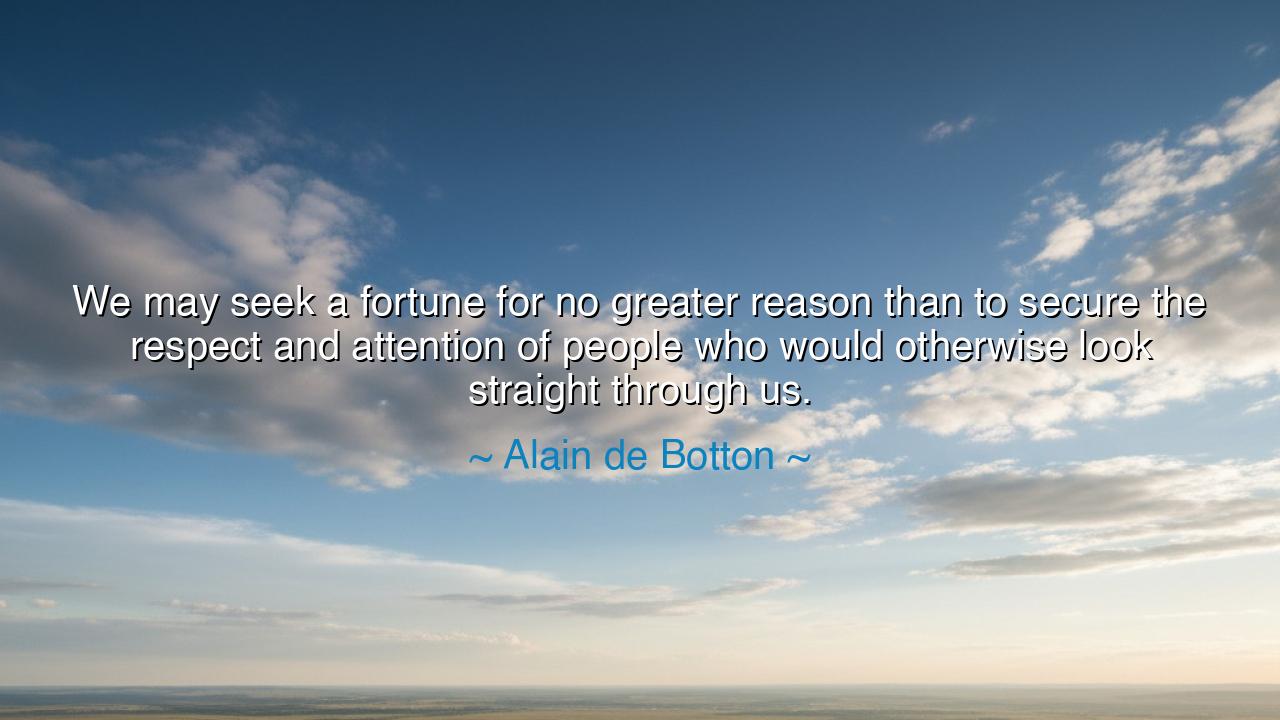
We may seek a fortune for no greater reason than to secure the
We may seek a fortune for no greater reason than to secure the respect and attention of people who would otherwise look straight through us.






Hearken to the words of Alain de Botton, whose reflection pierces the heart of human ambition. He observes that we may seek a fortune for no greater reason than to secure the respect and attention of people who would otherwise look straight through us. In this meditation lies an ancient truth: much of human striving is not guided by necessity, but by the yearning for recognition, the desire to be seen, acknowledged, and esteemed by our peers. The pursuit of wealth, power, or status often conceals a deeper hunger—a longing to affirm our existence in the eyes of others.
Since the earliest days of civilization, philosophers and sages have warned of the seductions of fame and fortune. In the courts of Rome, citizens labored to amass wealth not merely for survival, but to be noticed, to receive honor and applause. Aristotle reflected that the pursuit of external goods, if motivated solely by the desire for esteem, risks ensnaring the soul in vanity rather than virtue. De Botton’s words echo this ancient observation: the true cost of wealth is often measured in the degree to which it becomes a mirror of insecurity, a means of compensating for the fear of invisibility.
Consider the life of Marcus Crassus, the Roman magnate whose fortune was immense, yet whose ambition for recognition drove him into perilous military campaigns. Though his wealth was unparalleled, his quest for attention and respect ultimately led to his demise. Crassus’ story exemplifies de Botton’s insight: the desire for acknowledgment can fuel endeavors that, while seemingly rational, mask a deeper yearning for validation from those who might otherwise overlook us.
The pursuit of fortune for recognition is not merely a historical phenomenon—it resonates in modern life. Individuals labor tirelessly in careers, consume to impress, and compete for social validation, often forgetting the intrinsic value of self-respect and personal integrity. De Botton reminds us that many actions, which appear motivated by necessity, are in truth driven by the subtle craving for social acknowledgment, a craving that can overshadow wisdom and moral clarity.
Yet, this reflection need not lead to despair. Recognizing the motivation behind ambition is itself a form of liberation. To understand that our pursuit of fortune may be intertwined with the desire for respect allows us to reclaim our choices, to seek recognition consciously rather than unconsciously, and to align our efforts with values that endure beyond the fleeting gaze of others. Ancient philosophers called this self-awareness the first step toward virtue, and de Botton continues this timeless counsel.
A lesson emerges clearly: wealth and success, if sought solely for the admiration of others, risk leaving the soul hollow. True fulfillment arises not from external attention, but from cultivating self-respect, integrity, and meaningful engagement with the world. By recognizing the impulses that drive our ambitions, we may redirect them toward endeavors that enrich the self and community, rather than merely the perception of the self in others’ eyes.
Practical guidance flows naturally: reflect upon your motivations, question whether your pursuits are guided by genuine purpose or by the desire to be noticed. Seek accomplishments that bring personal growth, enrich others, and cultivate lasting satisfaction. By doing so, one transforms the pursuit of fortune into a path of meaningful impact rather than a hollow quest for validation.
Thus, heed the wisdom of Alain de Botton: understand the subtle currents that propel human ambition, and temper the desire for recognition with self-awareness and virtue. Let your labors serve purpose, not mere visibility; let your actions cultivate lasting respect, starting within your own heart. In this manner, wealth and achievement become instruments of value, rather than mirrors of insecurity, and the soul finds acknowledgment not in the eyes of the many, but in the steadfast light of conscience and self-respect.






AAdministratorAdministrator
Welcome, honored guests. Please leave a comment, we will respond soon